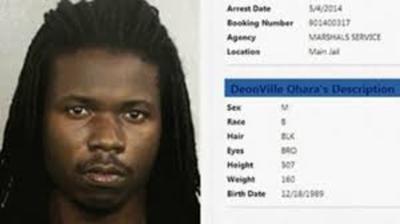Want to get your music out to over 40k radio and sound system dis? CLICK HERE
Stay up-to-date with all that's new at Dancehallreggaeworld, Click Here to subscribe for my updates and don't miss a thing!
Popular Disc Jock ZJ Wah Wa charged with multiple offences in American lottery scam probe
Popular Jamaican disc jockey, Deon-ville O’Hara, more popularly known as ZJ Wah Wa has been charged by federal authorities in the United States in relation to a lottery scam investigation in which he is alleged to be part of a group scamming elderly residents in the Dakotas and elsewhere.
Reports Wednesday confirmed The ZIP FM personality is one of 26 people indicted by a federal grand jury in North Dakota and has been charged with conspiracy to commit mail and wire fraud as well as money laundering, according to the Associated Press. Each of the counts carry a maximum prison term of 30 years.
It is alleged that O’Hara and others ran a lottery scam in Jamaica in which they convinced several elderly victims to send them millions of dollars to cover fees for lottery winnings. O’Hara would then travel to the U.S. to collect the money from victims, according to prosecutors.
The initial indictment, which was unsealed Tuesday, includes a case in which one 83-year-old North Dakota woman sent seven cheques totaling US$158,000 after being promised nearly US$19 million in winnings. In another instance, a South Dakota man sent a cashier’s cheque totaling US$14,000 after he was promised US$3.5 million in lottery winnings, as well as a 2012 Mercedes.
In November, O’Hara was stopped at Sangster International Airport by local customs officials after US$105,000 was found in his possession. Investigators believe this money was part of the proceeds from the alleged scam.
However, O’Hara was not arrested until earlier this month when he visited Florida. He currently sits in a Miami jail, but has requested that he be transferred to a North Dakota facility, according to his lawyer, Herman Frank Rubio Jr.
ZJ Wah Wa is the second Jamaican entertainment personality to be arrested in an alleged lottery scam. In February, Tommy Lee Sparta was charged with breaches of Jamaica’s anti-lottery act after authorities found lists of American citizens and other materials believed to have been used in the scam.
Want to learn more about Reggae Music? check these pages below...
New! Talk to me
Was the information helpful? Something needs changing? I welcome your feedback here.
Great Articles You Might Have Missed
Please send us your Feedback, News, Photos, Press Releases, Music and/or Videos to our WhatsApp Number: 1-876-395-8008 or Email: necoflex@gmail.com
Not what you are looking for? Search the web for more Dancehall Reggae music information below...









